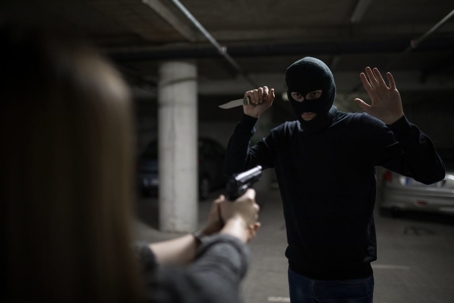We recently represented a client that was charged with aggravated assault with a deadly weapon. The case itself was very straightforward. Our guy (we’ll call him Joe) was at a bar and accidentally bumped into another guy (who we’ll call Bob). Joe and Bob exchanged some words, and Bob asked Joe to come with him outside. As Joe was walking outside, Bob attacked Joe by jumping on him and putting him in a chokehold. They wrestled a little bit, and somehow, they ended up on the ground. Bob got the upper hand, pinned Joe to the ground, straddled Joe, and started strangling Joe. Joe, in a last-ditch effort to get away from Bob, reached down to his waist, pulled out a handgun, and shot Bob. Local law enforcement arrived shortly afterward, arrested Joe, and charged him with aggravated assault with a deadly weapon.
We took the case to trial, and the trial lasted three days. The trial centered around two main questions: 1) did Joe act in self-defense when he shot Bob; and 2) was Joe’s use of a gun against Bob excessive, even though Bob was strangling Joe and could have killed him?
So, when does self-defense apply? Generally, for a person to exercise self-defense, the person must have either been resisting another’s attempt to commit a serious crime against him, or he must have had a reasonable belief that the other person intended to cause serious bodily harm and that the other person had an immediate ability to do so. In other words, Person A must have been trying to keep Person B from seriously hurting or killing Person A, or Person A must have thought that Person B was about to cause serious injury or death.
But that’s not the end of it. Mississippi law also explains that if a person acts in self-defense, they cannot use excessive force, which means that they cannot use more force than is reasonable under the circumstances.
Joe’s case was the perfect case to show how the law is supposed to be applied. The State argued that Joe did not act in lawful self-defense when he shot Bob, but also argued that even if he was able to use self-defense, then the use of a gun to fend off Bob, Joe’s attacker, was excessive. We argued that under the circumstances, because Bob attacked Joe first, Joe had an absolute right to exercise self-defense. We also argued that when Bob pinned Joe to the ground, straddling Joe, and wrapped his hands around Joe’s neck, and began choking him, it changed the game completely, and also gave Joe a right to use deadly force to keep himself from being seriously hurt or even killed. The result? You guessed it…NOT GUILTY.
But how could it have turned out differently? There were really two points where it could have been a completely different case. If Joe had attacked first, then self-defense likely would not have applied, since he was the first aggressor. Also, just because Joe was being attacked did not necessarily mean that he could use deadly force to fend off his attacker. Had Bob only been hitting Joe, and had not choked him, then Joe’s use of a firearm likely would have been excessive.
The point to remember is that even though self-defense may seem like an easy defense to use, it must be used the right way under the right circumstances. An experienced lawyer must think strategically when it comes to asserting self-defense, otherwise, they run the risk of exposing their client to a claim that their use of force was excessive.
